Find Help
More Items From Ergsy search
-
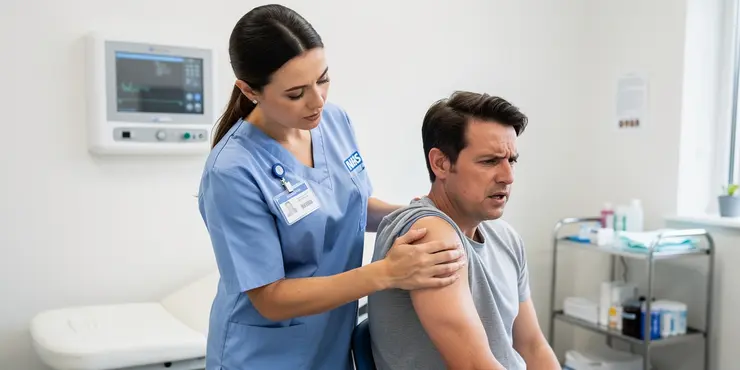
DBTH VFC DISLOCATED SHOULDER
Relevance: 100%
-
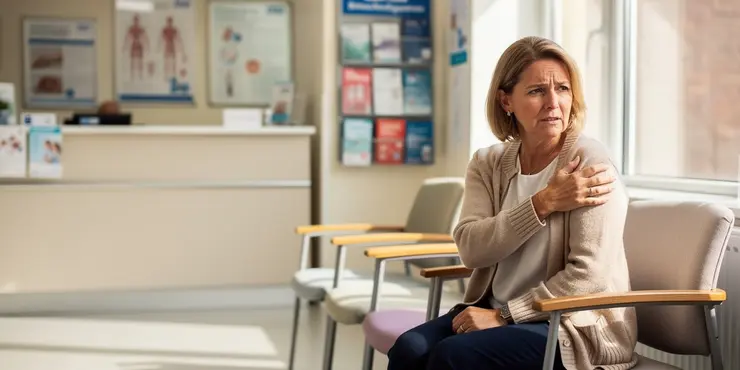
Shoulder pain | NHS
Relevance: 54%
-
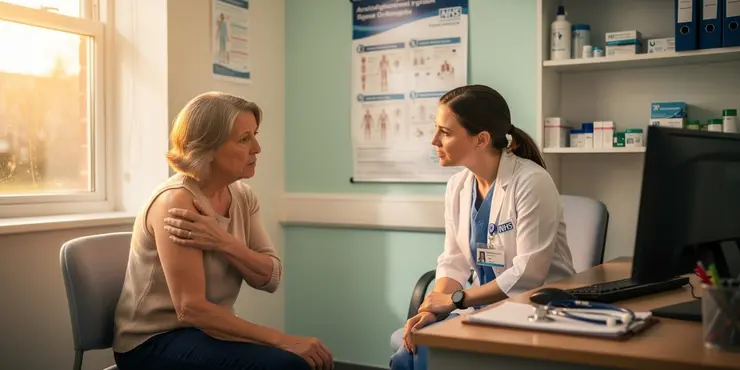
Shoulder pain | NHS
Relevance: 52%
-
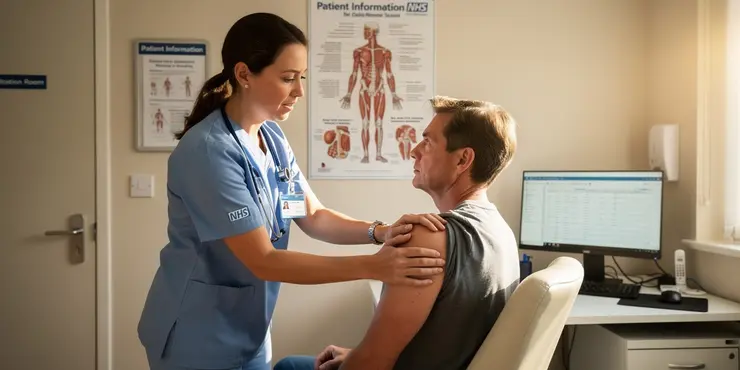
Shoulder subacromial shoulder pain
Relevance: 50%
-
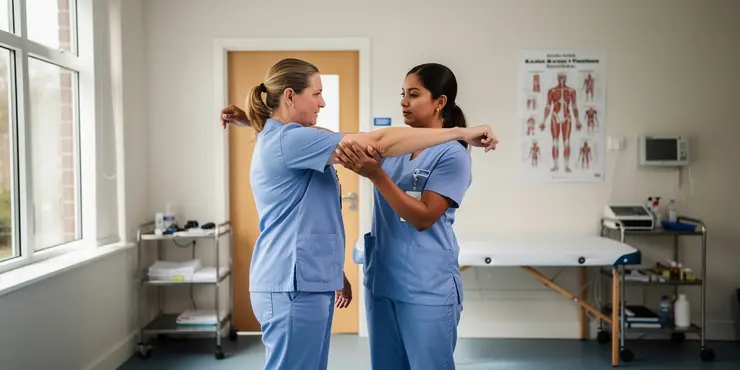
Frozen Shoulder Anterior Shoulder Stretch
Relevance: 49%
-
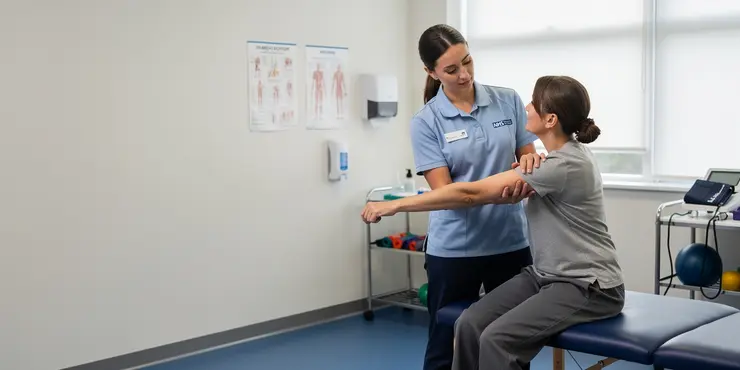
Frozen Shoulder
Relevance: 47%
-
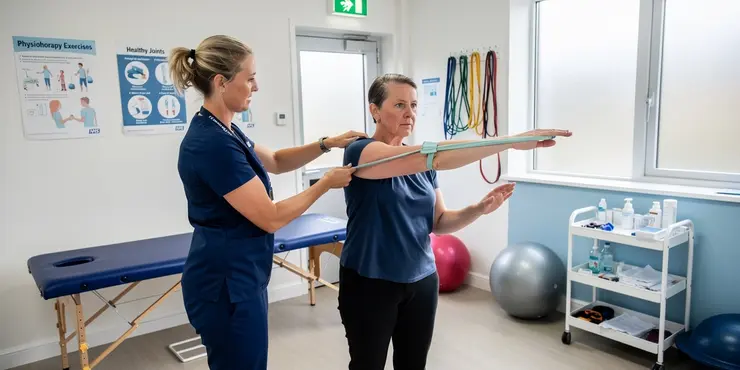
Shoulder Exercises 1
Relevance: 47%
-
Shoulder pain | NHS
Relevance: 45%
-
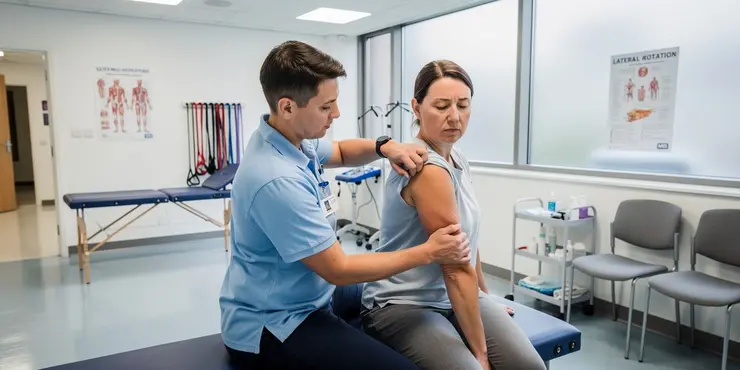
Frozen Shoulder Lateral Rotation
Relevance: 43%
-
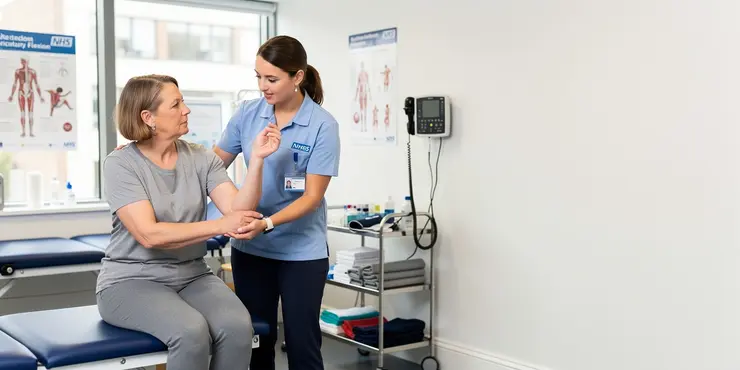
Frozen Shoulder Assisted Flexion
Relevance: 43%
-
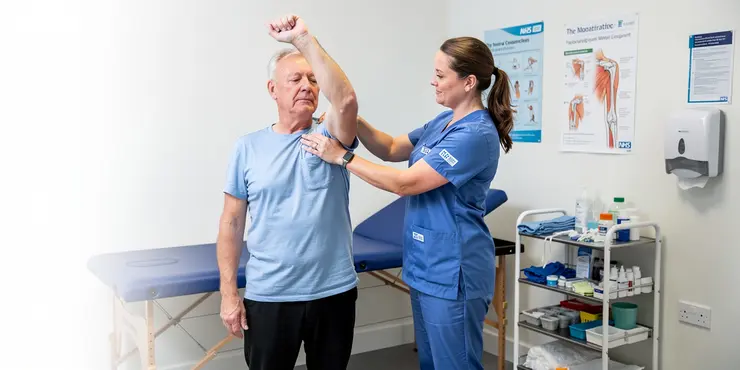
Frozen Shoulder Assisted Abduction
Relevance: 43%
-
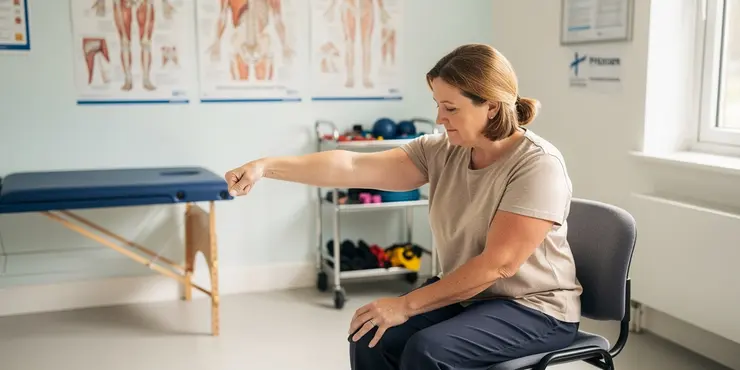
Frozen shoulder Pendular Exercises
Relevance: 42%
-
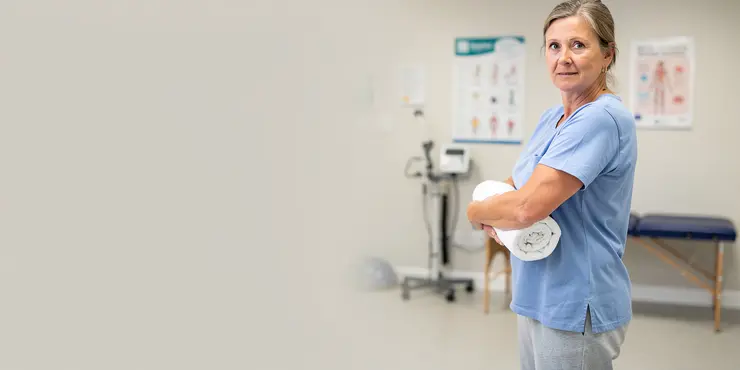
Frozen Shoulder Assisted Lateral Rotation
Relevance: 41%
-
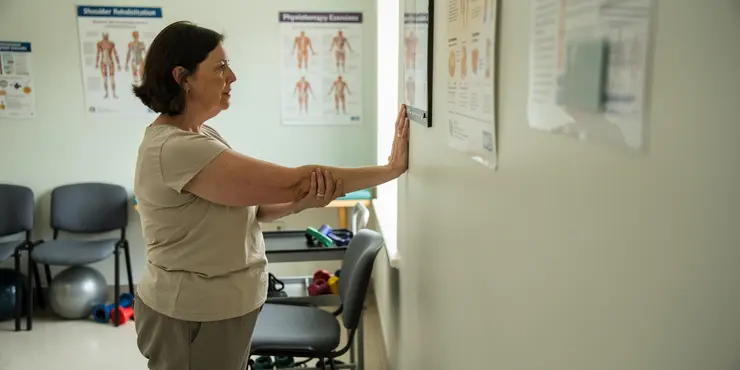
Frozen Shoulder Isometric External Rotation
Relevance: 41%
-
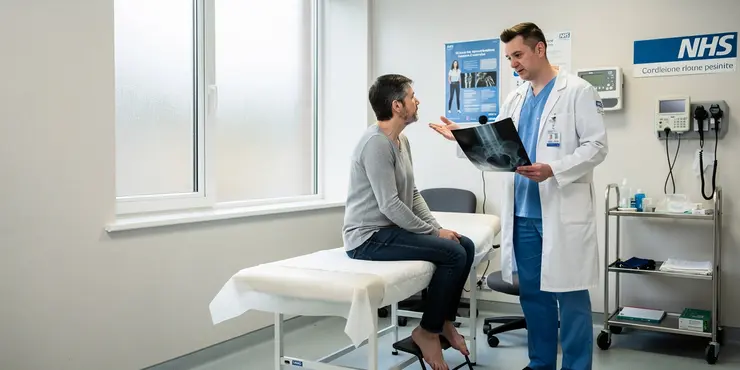
What are the risks associated with hip replacement surgery?
Relevance: 19%
-
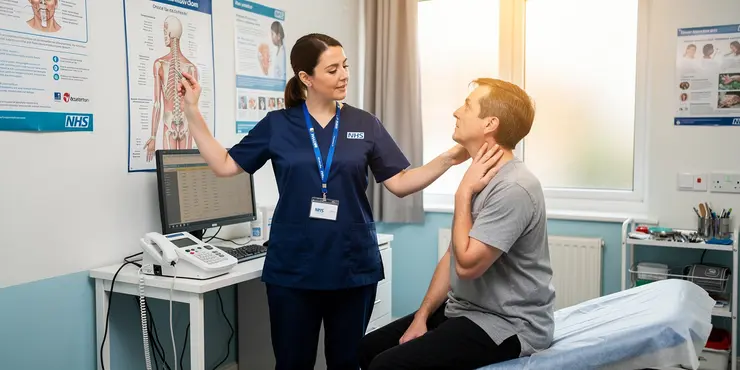
What are the symptoms of whiplash?
Relevance: 14%
-
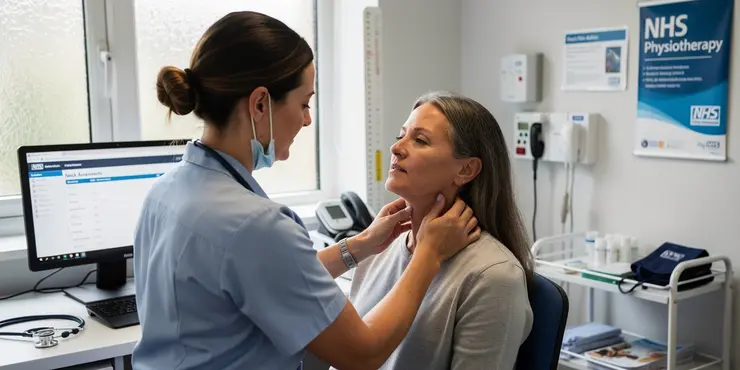
What medical tests are used to diagnose whiplash?
Relevance: 13%
-
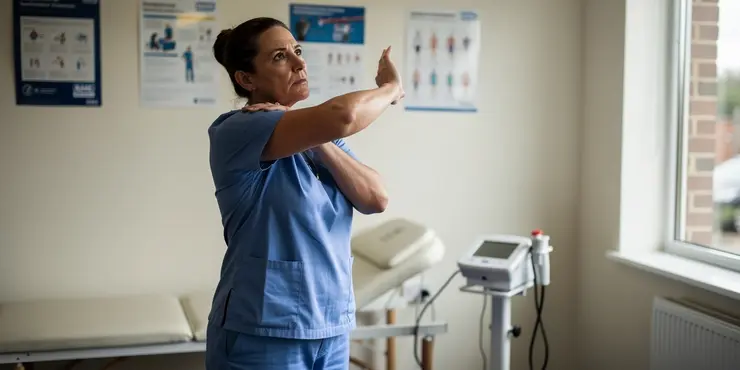
Neck Exercises
Relevance: 13%
-
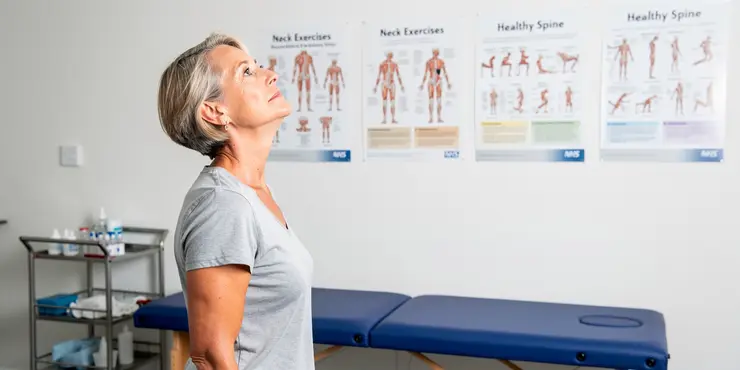
Neck Care Exercises
Relevance: 13%
-

Total Hip Replacement
Relevance: 12%
-

Do chiropractors only treat the spine?
Relevance: 12%
-
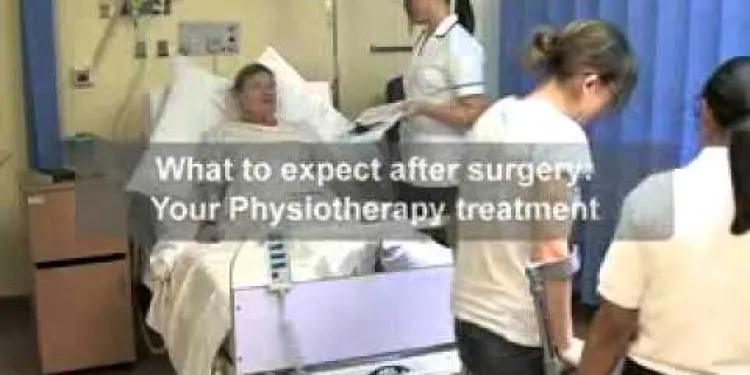
Total hip replacement
Relevance: 11%
-
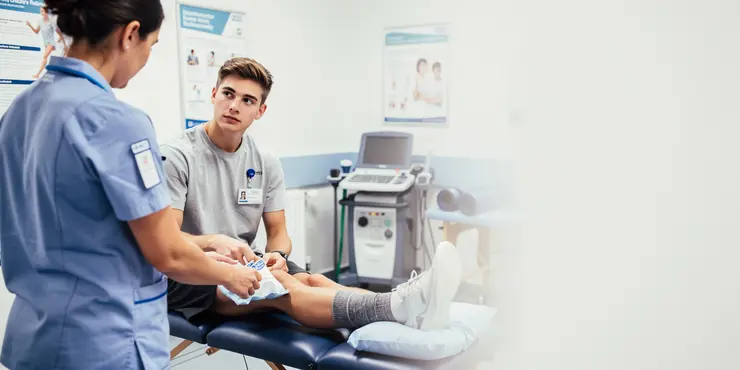
Advice on sports injuries
Relevance: 11%
-
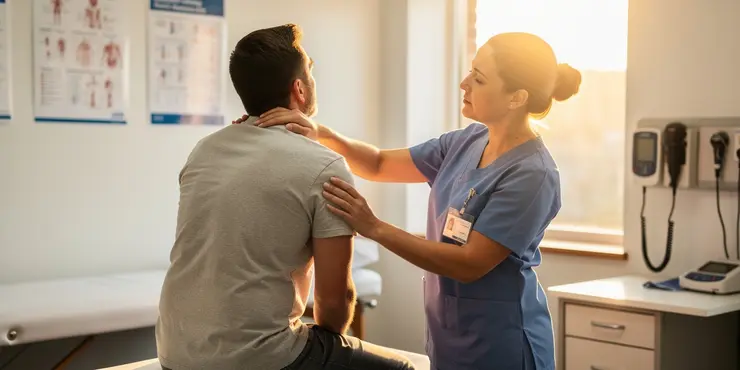
How is whiplash diagnosed?
Relevance: 11%
-
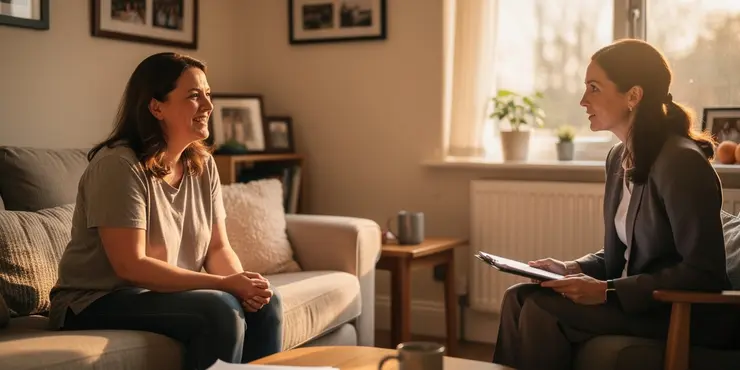
Evidence-Based Interventions: breast reduction
Relevance: 11%
-
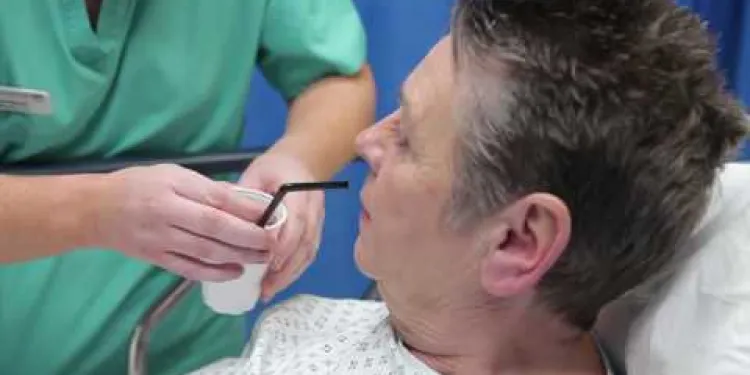
Hip replacement
Relevance: 11%
-

How can you differentiate nits from dandruff?
Relevance: 10%
-
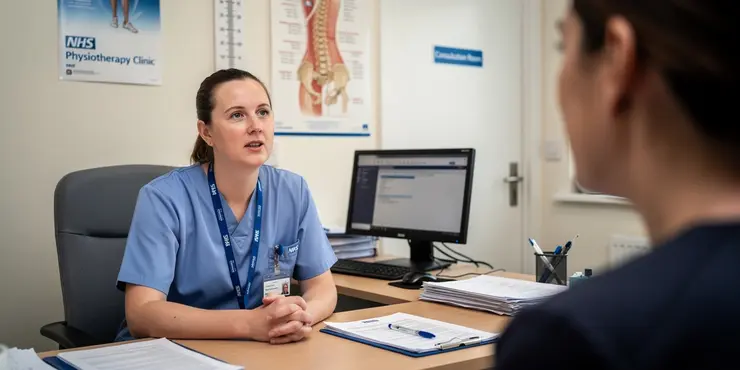
Advice on neck pain and whiplash
Relevance: 10%
-
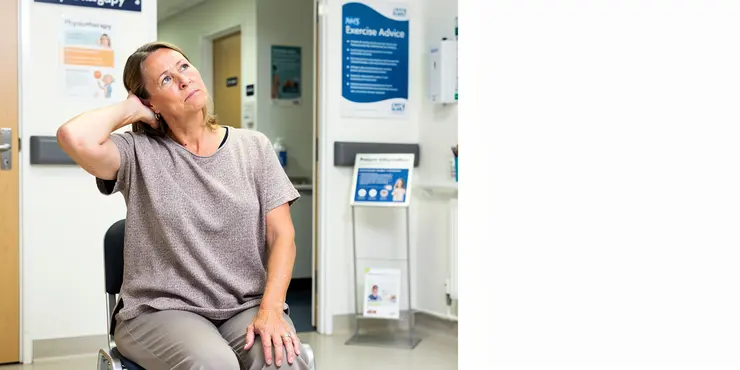
Neck Exercises
Relevance: 10%
-
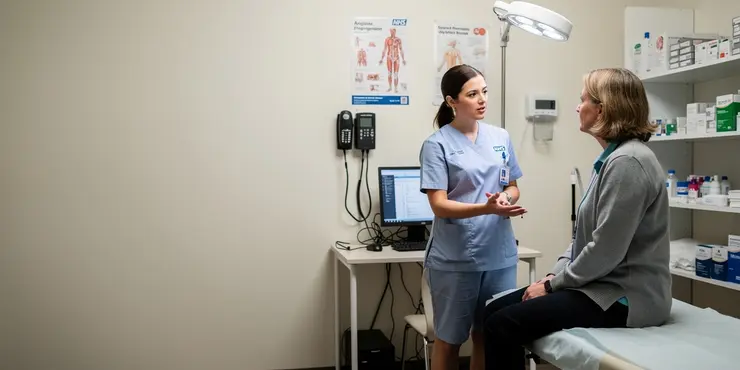
What is angina and how is it treated?
Relevance: 9%
-
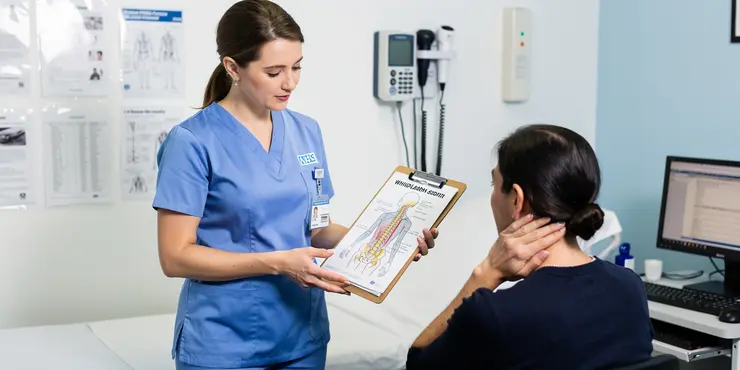
How long do symptoms of whiplash usually continue?
Relevance: 8%
-
How can I prevent Carpal Tunnel Syndrome?
Relevance: 8%
-

Should I warm up before walking to work?
Relevance: 7%
-
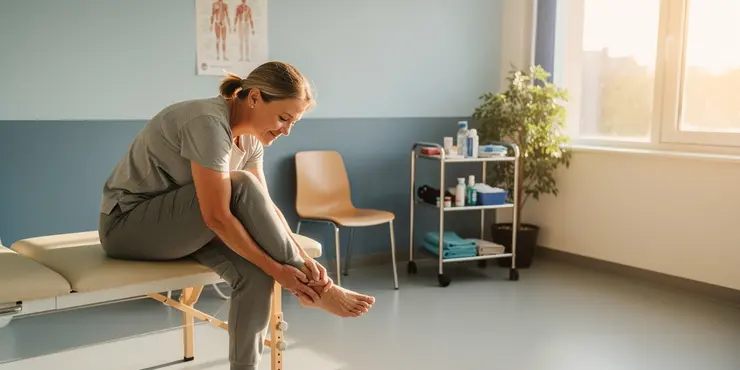
Exercises for sciatica: herniated or slipped disc | NHS
Relevance: 7%
-
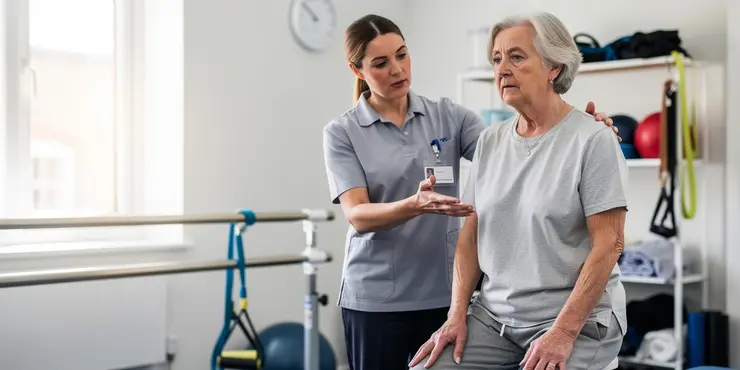
Will I need physical therapy after a hip replacement?
Relevance: 7%
-
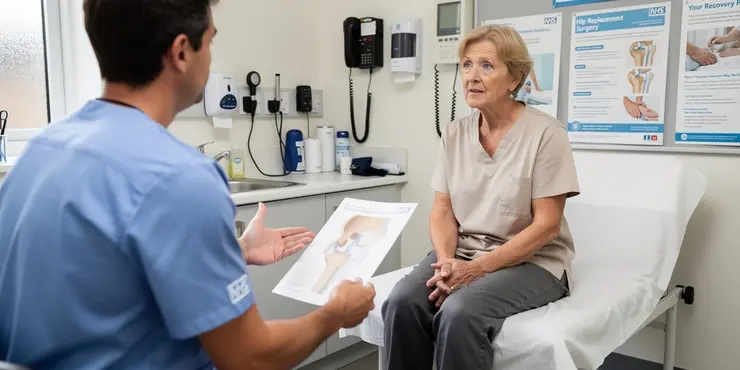
What is minimally invasive hip replacement surgery?
Relevance: 7%
-
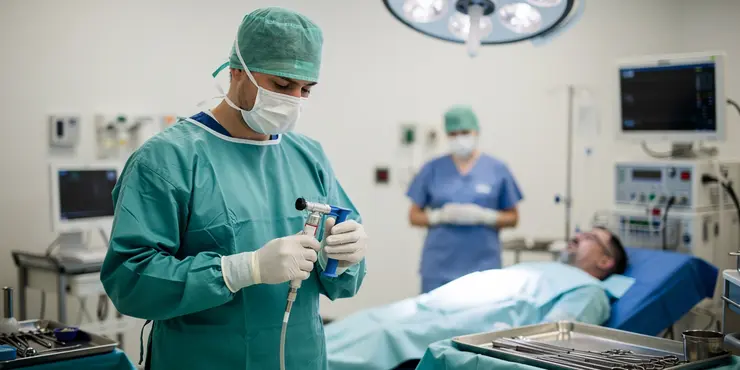
What is bone cement?
Relevance: 6%
-
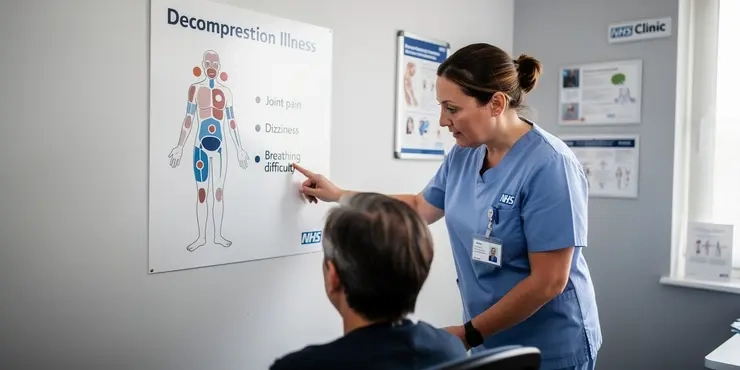
An Introduction to Decompression Illness: Signs & Symptoms”. Dr Roland Armes
Relevance: 6%
-
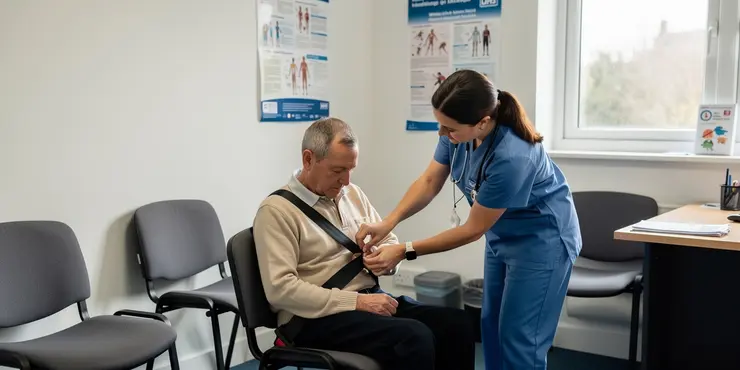
Does wearing a seatbelt prevent whiplash?
Relevance: 6%
-
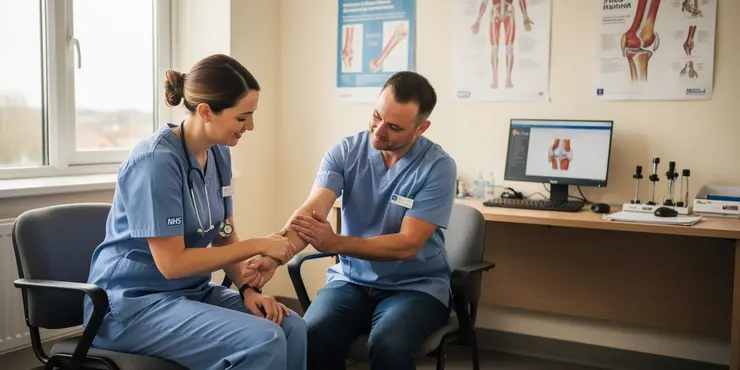
Elbow
Relevance: 6%
DBTH VFC Dislocated Shoulder
Introduction to Dislocated Shoulder
A dislocated shoulder occurs when the upper arm bone pops out of the cup-shaped socket that's part of your shoulder blade. This can happen due to a sudden blow, fall, or injury during sports. Doncaster and Bassetlaw Teaching Hospitals Virtual Fracture Clinic (DBTH VFC) offers comprehensive care and support for patients suffering from this painful condition.
Symptoms of a Dislocated Shoulder
Common symptoms of a dislocated shoulder include:
- Severe pain and inability to move the shoulder
- Swelling or bruising around the joint
- Visible deformity or irregularities in the shoulder contour
- Numbness, weakness, or tingling down the arm
Initial Treatment and Diagnosis
If you suspect a dislocated shoulder, it's important to seek medical attention immediately. The proper initial treatment includes:
- Immobilizing the shoulder using a sling or splint
- Applying ice packs to reduce swelling and pain
- Avoiding any attempts to move or reset the shoulder on your own
A healthcare provider at DBTH VFC will perform a physical examination and may order an X-ray to confirm the dislocation and assess for any fractures or additional injuries.
Treatment at DBTH VFC
At the Doncaster and Bassetlaw Teaching Hospitals Virtual Fracture Clinic, the treatment usually involves:
- Reduction: The medical professional will gently maneuver the bone back into place.
- Rehabilitation: Once the shoulder is repositioned, physiotherapy is often recommended to restore strength and mobility.
- Follow-up Care: Regular follow-up appointments ensure proper healing and prevent future dislocations.
Prevention Tips
To reduce the risk of a future dislocation, patients are advised to:
- Engage in strengthening exercises for the shoulder muscles
- Avoid activities that could pose a risk of another injury
- Wear protective gear during contact sports
Conclusion
A dislocated shoulder is a serious injury that requires prompt and appropriate treatment. The experts at DBTH VFC provide exceptional care and guidance to ensure a full recovery and help prevent future dislocations. If you or someone you know has suffered a dislocated shoulder, contact DBTH VFC immediately for professional medical assistance.
DBTH VFC Dislocated Shoulder
What is a Dislocated Shoulder?
A dislocated shoulder happens when the top of your arm comes out of its place. It might happen if you fall or get hurt while playing sports. Doctors at Doncaster and Bassetlaw Hospitals can help if this happens to you.
Signs of a Dislocated Shoulder
Here are some signs that your shoulder might be dislocated:
- It hurts a lot and you can’t move your shoulder
- Your shoulder might look swollen or bruised
- Your shoulder might look strange or different
- You might feel tingling or weakness in your arm
What to Do First
If you think your shoulder is dislocated, get medical help right away. Do these things while you wait:
- Keep your shoulder still with a sling or splint
- Put ice on it to help with swelling and pain
- Don’t try to move or put the shoulder back yourself
A doctor will check your shoulder and might take an X-ray to see exactly what happened.
How DBTH VFC Can Help
At the Doncaster and Bassetlaw Hospitals, doctors will help by:
- Gently moving the bone back where it belongs
- Helping you do exercises to make your shoulder strong again
- Setting up follow-up visits to see how you are healing
Tips to Avoid Another Dislocation
Here are some tips to help keep your shoulder safe in the future:
- Do exercises to make your shoulder muscles stronger
- Avoid risky activities that might injure your shoulder again
- Wear protective gear when playing sports
Summing Up
A dislocated shoulder is a serious problem that needs fast treatment. The doctors at DBTH VFC are here to help you get better and keep your shoulder safe. If you or someone else’s shoulder gets dislocated, contact DBTH VFC for help.
Frequently Asked Questions
What is a dislocated shoulder?
A dislocated shoulder occurs when the ball of the upper arm bone pops out of the shoulder socket, causing pain and immobility.
What are the common causes of shoulder dislocation?
Common causes include falls, sports injuries, and trauma such as car accidents.
What are the symptoms of a dislocated shoulder?
Symptoms can include severe pain, inability to move the shoulder, swelling, and a visible deformity.
How is a dislocated shoulder diagnosed?
A dislocated shoulder is typically diagnosed through a physical exam and confirmed with imaging tests such as X-rays.
What should I do immediately after dislocating my shoulder?
Immobilize the arm using a sling, apply ice to reduce swelling, and seek medical attention immediately.
Can a dislocated shoulder be treated at home?
No, a dislocated shoulder requires professional medical treatment to properly reposition the joint and prevent complications.
How is a dislocated shoulder treated?
Treatment typically involves a procedure to reposition the shoulder, followed by immobilization, pain management, and physical therapy.
What is a shoulder reduction?
A shoulder reduction is a procedure to reposition the dislocated joint back into its proper place.
How long does it take to recover from a dislocated shoulder?
Recovery time varies, but it usually takes several weeks to a few months, depending on the severity of the injury and the effectiveness of rehabilitation.
Can I prevent shoulder dislocation?
Preventative measures include strengthening shoulder muscles, avoiding risky activities, and using proper techniques in sports.
What are the possible complications of a dislocated shoulder?
Complications can include recurrent dislocations, nerve or blood vessel damage, and chronic shoulder instability.
Will I need surgery for a dislocated shoulder?
Surgery is rare but may be needed if there is significant damage to the shoulder structures or if dislocations become recurrent.
Can I resume sports after a shoulder dislocation?
Yes, but it is crucial to complete rehabilitation and get clearance from a healthcare professional before returning to sports activities.
What type of physical therapy is involved in dislocated shoulder rehabilitation?
Physical therapy focuses on restoring range of motion, strengthening shoulder muscles, and improving stability.
When should I contact a healthcare professional after a shoulder dislocation?
You should contact a healthcare professional if you experience severe pain, increased swelling, a feeling of instability, or any signs of infection.
What is a dislocated shoulder?
A dislocated shoulder is when the bone in your shoulder comes out of its place. This can hurt a lot. It often happens if you fall or get hit hard.
To help with a dislocated shoulder, you should see a doctor. They can help put the bone back in place.
Try using pictures to understand what a dislocated shoulder looks like. You can also watch videos with simple explanations.
If you need help reading, you can ask someone to read with you. Point to each word as you go along.
A dislocated shoulder happens when the top part of your arm bone comes out of the shoulder joint. This can hurt a lot and make it hard to move your arm.
Why does a shoulder come out of place?
A shoulder can come out of place if:
- You fall and land on your shoulder.
- You get hit in the shoulder.
- You move your arm too far.
For help, you can:
- Ask a grown-up or a doctor.
- Look at pictures or videos about shoulders.
People can get hurt if they fall, get injured playing sports, or have an accident like a car crash.
What happens when your shoulder is out of place?
Your shoulder can move in the wrong way and cause pain. Here is what you might feel:
- Lots of pain in your shoulder
- Your shoulder looks strange or different
- You can't move your shoulder very well
- Your shoulder, arm, or hand feel tingly or numb
If any of this happens, ask an adult to help you see a doctor. They can check your shoulder.
Tools and tips:
- Use pictures to understand better
- Ask someone to read it to you
- Use simple words to talk about it
Signs of a hurt shoulder can include bad pain. You might not be able to move your shoulder. It could get swollen or look different.
How do doctors find out if someone has a dislocated shoulder?
Doctors check if someone has a dislocated shoulder by doing some things:
- They ask about how the injury happened.
- They look at the shoulder to see if it is swollen or looks different.
- They may touch the shoulder to feel where it hurts.
- They might use an X-ray or other pictures to see inside the shoulder.
These steps help doctors make sure the shoulder is dislocated.
A dislocated shoulder happens when the bone in your shoulder comes out of its place. Doctors can tell if you have a dislocated shoulder by looking at it and by taking a special picture called an X-ray.
What to do if your shoulder pops out?
If your shoulder pops out, you need to stay calm. Tell someone to help you, like a friend or family member. Do not try to push your shoulder back yourself. Here are some steps to follow:
- Sit down and support your arm. You can use a pillow or a sling.
- Keep your shoulder still. Don’t move it.
- Put ice on your shoulder to help with pain and swelling.
- Ask someone to call a doctor or an ambulance.
It is important to see a doctor so they can fix your shoulder safely.
If you find it hard to follow these steps, you can:
- Use pictures to remember what to do.
- Ask someone you trust to help you.
Keep the arm still by using a sling. Put ice on it to help with swelling. Get a doctor to look at it right away.
Can you fix a dislocated shoulder at home?
No, if you have a dislocated shoulder, you need to see a doctor. They will help put your shoulder back in place. This is important to stop any problems from happening.
How do doctors fix a dislocated shoulder?
A dislocated shoulder means the top part of your arm is out of its normal place.
Here is how doctors help fix it:
- First, you see a doctor or go to the hospital.
- The doctor may give you medicine to help with pain.
- The doctor will move your arm gently to put the bones back in place.
- After it is fixed, you might get an arm sling to keep the shoulder still.
- You will rest your arm and may do special exercises to get strong again.
Tools to help:
- Ask someone to go with you to the doctor for support.
- You can watch videos about shoulder care made for kids.
The treatment usually starts with moving the shoulder back in place. After that, the shoulder is kept still, pain is managed, and there are exercises to help it get better.
What is shoulder reduction?
Shoulder reduction is when a doctor puts the shoulder back in place after it has come out. It is like fixing a puzzle piece. The shoulder is put back to where it is supposed to be.
If you have trouble reading, you can ask someone to read the words out loud to you, or look for videos that show what shoulder reduction is.
A shoulder reduction is when a doctor moves a shoulder joint back to where it should be because it is out of place.
How long to feel better after a shoulder pops out?
It can take a few weeks to feel better.
Everyone is different. Some people might take longer.
Here are some ways to help:
- Rest your shoulder.
- Use ice packs for swelling.
- Do gentle exercises to help your shoulder.
- Visit a doctor or therapist if you need help.
Getting better can take some time. It can be a few weeks or even a few months. How long it takes depends on how bad the injury is and how well the recovery exercises work.
Can I stop my shoulder from popping out?
Your shoulder can pop out when it gets hurt. Here are some tips to help keep it safe:
- Do exercises to make your shoulder strong and stretchy.
- Ask a doctor or therapist for help with your shoulder.
- Be careful when playing sports or lifting heavy things.
- Wear protective gear if you might hurt your shoulder.
If your shoulder hurts a lot, tell an adult or see a doctor.
You can help keep your shoulders safe by making the muscles strong. Try not to do things that might hurt your shoulders. Also, learn the right way to play sports. A support tool might be using a good coach or videos to show you how to do it right.
What can happen if you hurt your shoulder?
If you hurt your shoulder really bad, it might move out of its place. This is called a dislocated shoulder. Here are some things that might happen:
- Your shoulder might hurt a lot.
- You might not be able to move your arm.
- Your shoulder could swell and get bigger.
- You might feel like your shoulder is weak.
If you think you have a dislocated shoulder, get help from a doctor. Using pictures or talking to someone can help you understand more.
Problems can happen if the shoulder keeps coming out of place. It can hurt the nerves and blood flow. This might make your shoulder feel weak all the time.
Do I need an operation for a dislocated shoulder?
If your shoulder has come out of place, the doctor might fix it without an operation. But, some people might need an operation to make it better.
Here are some things that can help:
- Use a sling to keep your arm still.
- Do gentle exercises to make your shoulder strong.
- Ask your doctor if you need an operation.
- Use pictures or videos to understand better.
If you have questions, ask your doctor or a nurse to explain it in a way that's easy to understand.
Surgery is not needed often, but sometimes it is important. This can happen if the shoulder is very hurt or keeps coming out of place.
Can I play sports again after hurting my shoulder?
If you hurt your shoulder and it came out of place, talk to your doctor. They will tell you when you can play sports again. You might need to rest and do some special exercises to get strong. A physiotherapist can help you with exercises. Always listen to your body and don't rush. Ask a grown-up for help if you are not sure what to do.
Yes, you can return to sports, but you must finish all your rehab exercises first. You also need a doctor to say it's okay before you start playing again.
What kind of exercises help fix a dislocated shoulder?
If your shoulder gets hurt and comes out of its place, a doctor or therapist can help you get better. They might show you some simple exercises to make your shoulder strong again. You can use pictures or videos to see how to do these exercises.
You might also use tools like stretchy bands to help.
A therapist will guide you so you don't get hurt again.
Physical therapy helps you move better. It makes shoulder muscles strong and keeps them steady.
When do I need to see a doctor after I hurt my shoulder?
If your shoulder pops out, see a doctor soon. Ask for help if it hurts a lot. Don't wait too long. Keep your shoulder still and don't move it. Use ice to help with pain. It's important to get help to make it better.
If you feel a lot of pain, if your body part swells up more, if you feel like you might fall, or if you notice any signs of infection, you should talk to a doctor or nurse.
Useful Links
This website offers general information and is not a substitute for professional advice.
Always seek guidance from qualified professionals.
If you have any medical concerns or need urgent help, contact a healthcare professional or emergency services immediately.
Some of this content was generated with AI assistance. We’ve done our best to keep it accurate, helpful, and human-friendly.
- Ergsy carfully checks the information in the videos we provide here.
- Videos shown by Youtube after a video has completed, have NOT been reviewed by ERGSY.
- To view, click the arrow in centre of video.
- Most of the videos you find here will have subtitles and/or closed captions available.
- You may need to turn these on, and choose your preferred language.
- Go to the video you'd like to watch.
- If closed captions (CC) are available, settings will be visible on the bottom right of the video player.
- To turn on Captions, click settings .
- To turn off Captions, click settings again.
More Items From Ergsy search
-

DBTH VFC DISLOCATED SHOULDER
Relevance: 100%
-

Shoulder pain | NHS
Relevance: 54%
-

Shoulder pain | NHS
Relevance: 52%
-

Shoulder subacromial shoulder pain
Relevance: 50%
-

Frozen Shoulder Anterior Shoulder Stretch
Relevance: 49%
-

Frozen Shoulder
Relevance: 47%
-

Shoulder Exercises 1
Relevance: 47%
-
Shoulder pain | NHS
Relevance: 45%
-

Frozen Shoulder Lateral Rotation
Relevance: 43%
-

Frozen Shoulder Assisted Flexion
Relevance: 43%
-

Frozen Shoulder Assisted Abduction
Relevance: 43%
-

Frozen shoulder Pendular Exercises
Relevance: 42%
-

Frozen Shoulder Assisted Lateral Rotation
Relevance: 41%
-

Frozen Shoulder Isometric External Rotation
Relevance: 41%
-

What are the risks associated with hip replacement surgery?
Relevance: 19%
-

What are the symptoms of whiplash?
Relevance: 14%
-

What medical tests are used to diagnose whiplash?
Relevance: 13%
-

Neck Exercises
Relevance: 13%
-

Neck Care Exercises
Relevance: 13%
-

Total Hip Replacement
Relevance: 12%
-

Do chiropractors only treat the spine?
Relevance: 12%
-

Total hip replacement
Relevance: 11%
-

Advice on sports injuries
Relevance: 11%
-

How is whiplash diagnosed?
Relevance: 11%
-

Evidence-Based Interventions: breast reduction
Relevance: 11%
-

Hip replacement
Relevance: 11%
-

How can you differentiate nits from dandruff?
Relevance: 10%
-

Advice on neck pain and whiplash
Relevance: 10%
-

Neck Exercises
Relevance: 10%
-

What is angina and how is it treated?
Relevance: 9%
-

How long do symptoms of whiplash usually continue?
Relevance: 8%
-
How can I prevent Carpal Tunnel Syndrome?
Relevance: 8%
-

Should I warm up before walking to work?
Relevance: 7%
-

Exercises for sciatica: herniated or slipped disc | NHS
Relevance: 7%
-

Will I need physical therapy after a hip replacement?
Relevance: 7%
-

What is minimally invasive hip replacement surgery?
Relevance: 7%
-

What is bone cement?
Relevance: 6%
-

An Introduction to Decompression Illness: Signs & Symptoms”. Dr Roland Armes
Relevance: 6%
-

Does wearing a seatbelt prevent whiplash?
Relevance: 6%
-

Elbow
Relevance: 6%


